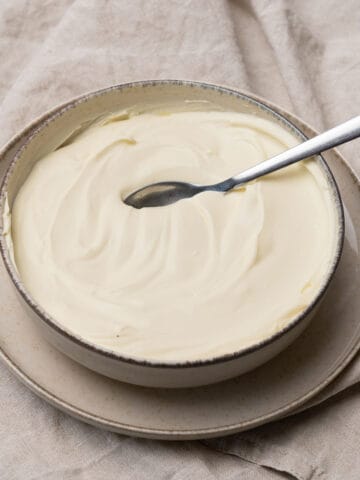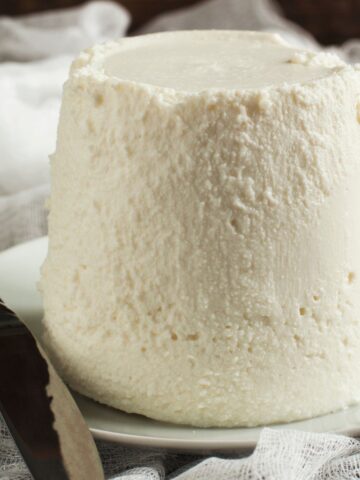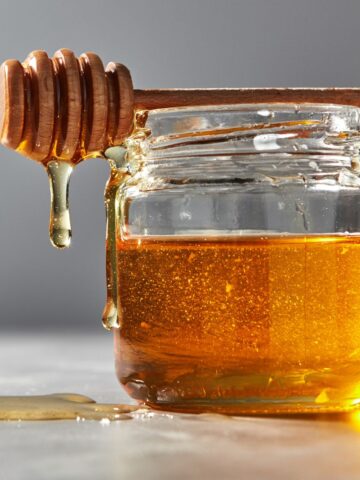Running out of vegetable oil doesn't mean your baking plans need to stop! There are plenty of excellent substitutes for vegetable oil in baking, each offering unique textures and flavors that can enhance your desserts. Butter, coconut oil, avocado oil, applesauce, Greek yogurt, and nut butters can all be used as replacements for vegetable oil in your recipes, to name a few.
In this guide, I'll help you choose the ideal vegetable oil substitute for brownies, so your treats remain fudgy and moist. I'll also explain the best vegetable oil substitute for cake to ensure your layers come out tender and flavorful every time. With clear conversion tips and easy-to-follow advice, you'll confidently bake tasty desserts, even when vegetable oil isn't an option.

Jump to:
- Quick Summary of The Most Commonly Asked Questions
- Best Vegetable Oil Substitutes for Brownies
- Best Vegetable Oil Substitutes for Cakes
- Best Vegetable Oil Substitutes for Muffins
- Best Healthy Vegetable Oil Substitute
- Vegan-friendly Vegetable Oil Substitute
- Now the Details: Considerations when replacing vegetable oil
- Detailed Guide to Each Vegetable Oil Substitute
- 1. Melted Butter
- 2. Ghee
- 3. Coconut Oil
- 4. Olive Oil
- 5. Avocado Oil
- 6. Shortening
- 7. Greek Yogurt
- 8. Applesauce
- 9. Nut Butters
- 10. Mayonnaise
- More Substitute Guides
Quick Summary of The Most Commonly Asked Questions
Best Vegetable Oil Substitutes for Brownies
Best vegetable oil substitute for brownies: Melted butter for a rich, fudgy texture. Replace one cup of vegetable oil with 1 ¼ cups of melted, cooled butter. Or, use coconut oil (1:1) for a dairy-free option with subtle coconut notes.
Best Vegetable Oil Substitutes for Cakes
Best vegetable oil substitute for cakes: Melted butter for a rich, buttery flavor. Replace one cup of vegetable oil with 1 ¼ cups of melted, cooled butter. Avocado oil and coconut oil at a 1:1 ratio offer a neutral flavor and keep cakes perfectly moist.
Best Vegetable Oil Substitutes for Muffins
Best vegetable oil substitute for muffins: Greek yogurt adds moisture, tang, and extra protein. Substitute one cup of vegetable oil with one cup of Greek yogurt. For muffins with a richer taste, melted butter works beautifully; use 1¼ cups melted, cooled butter per one cup of vegetable oil.
Best Healthy Vegetable Oil Substitute
Healthiest overall substitute: Applesauce or Greek yogurt, used in a 1:1 ratio, reduces calories and increases nutrients while maintaining moisture. You might want to compensate for the fat loss with an extra egg yolk or other fatty ingredients such as nut butter.
Vegan-friendly Vegetable Oil Substitute
Vegan-friendly substitute: Coconut oil or avocado oil, both effective at a simple 1:1 ratio. They are easy, plant-based alternatives without compromising baking results.
Now the Details: Considerations when replacing vegetable oil
Vegetable oil is a mild, odorless oil used for cooking, baking, and frying. What is worth noting is that vegetable oil has a high smoking point, which means it can withstand high temperatures. It is often used for frying for this very reason.
Many recipes use vegetable oil for baking because it has a neutral taste and will keep cakes, breads, and muffins soft and tender. Also, it is a very inexpensive fat that can easily be found in every grocery store.
But, if you need a baking substitute for vegetable oil, I can help! I know plenty of replacements for vegetable oil that are easy and tasty.
When replacing vegetable oil, you should consider what the oil does in the recipe. Is it being used to fry foods, keep muffins tender, or create an emulsion of ingredients? Perhaps you're looking for a low-fat vegetable oil substitute or one that contains more vitamins and minerals. You may also want to keep in mind that vegetable oil is vegan (unlike butter), a benefit that you may want to keep!
Learning the role of vegetable oil in your recipe is essential.
Detailed Guide to Each Vegetable Oil Substitute
1. Melted Butter
I know a lot about butter. In fact, I wrote a whole butter substitute guide as well! Butter is a great substitute for vegetable oil for baked goods as long as you know how to use it correctly. Butter is a great substitute for vegetable oil in baking muffins, and the best substitute for vegetable oil in baking cookies.
Real butter has a rich taste and creamy texture that is perfect as a substitute for oil in baking. While butter is the key fat ingredient in many baking recipes, butter does not keep baked goods as moist as other types of oils. You may find your muffins dry out quicker when using butter instead of vegetable oil.
Melted butter also has a low smoke point, making it unsuitable for deep frying. It is the best vegetable oil alternative for baking, though!

Best for:
Brownies, cakes, cookies, and muffins where a richer, buttery flavor is desired.
How to use it:
Replace one cup of vegetable oil with 1 ¼ cup of melted, cooled butter. The butter needs to be in a liquid consistency to blend correctly into your batter or dough.
2. Ghee
Ghee is an excellent low-fat substitute for vegetable oil and one of the best alternatives to traditional cooking oils. It is actually a butter that has been heat-treated to remove all the milk solids. Ghee contains a significant amount of omega-3 fatty acids, making it a healthier alternative to vegetable oil. Such a great swap!
Ghee is best used in recipes that need to be crispy as it browns faster than vegetable oil or butter. It also has a high smoke point so you can even use it for cooking and frying.
Best for:
Cookies, brownies, spice cakes, muffins, and desserts where a rich, nutty flavor is desirable.
How to use it:
Replace vegetable oil with ghee using a 1:1 ratio. So, the substitute for 1 cup vegetable oil for baking is one cup of ghee. Heat the ghee slightly so that it has a liquid consistency but is not too hot.
3. Coconut Oil
Coconut oil has a unique flavor that adds a subtle sweetness to your baked goods. It also has a high smoking point, so it is good for all kinds of cooking. If you're looking for a healthy vegetable oil substitute in baking, coconut oil is a great option. It contains numerous vitamins and minerals and is often regarded as a "healthy fat".
Best for:
Brownies, muffins, quick breads, and vegan baking recipes.
How to use it:
Use one cup of melted coconut oil as a replacement for one cup of vegetable oil. Use refined coconut oil if possible, which will have less flavor and match the taste of vegetable oil better.
4. Olive Oil
You may think that olive oil is only for cooking, but it can also be used for baking. It is a versatile vegetable oil substitute for baking bread, brownies, and many other dishes.
Extra-virgin olive oil has a strong, unique taste, but can also be tasty and exciting in baked goods, especially when paired with lemon or almond. The low smoke point makes it even more suitable for baking than for cooking or frying.

Best for:
Citrus cakes, muffins, brownies, and quick breads where added flavor is desirable.
How to use it:
Replace one cup of vegetable oil with one cup of olive oil. Blend the olive oil in the same way you would use vegetable oil, and your recipes will turn out perfectly.
Olive oil is also great for salad dressings and marinades. It will add more flavor than vegetable oil ever could!
5. Avocado Oil
Avocado oil has become increasingly popular over the years, and I'm a big fan of using it in baking. You can easily replace vegetable oil with avocado oil and end up with desserts that are more nutritious yet still incredibly tasty.
Refined avocado oil is virtually flavorless, making it ideal for baking and as a substitute for vegetable oil. It has a high smoking point, so you can fry with it, too. Avocado oil is fairly expensive so bear this in mind!
Best for:
Cakes, muffins, cupcakes, and breads that need neutral flavor.
How to use it:
Replace vegetable oil in baked goods with olive oil in a 1:1 ratio.
6. Shortening
Did you know that shortening is essentially vegetable oil in a solid state? If you have a jar of shortening in your pantry, you have vegetable oil on hand already. That means replacing vegetable oil with shortening is a seamless switch.
If you need a shortening alternative, however, check out my shortening substitute guide here!
Best for:
Cakes, cookies, muffins, and pastries needing fluffy texture without added flavors.
How to use it:
Use the liquid shortening to replace vegetable oil using a 1:1 ratio.
7. Greek Yogurt
Greek yogurt is a suitable replacement for vegetable oil in baking. While it isn't a fat or oil, it works much the same way in baked goods, making it a suitable alternative to vegetable oil. Greek yogurt will keep your cakes, brownies, and sweet breads tender and moist. Plus, it will reduce the amount of fat in your baked goods, giving them a lower-calorie makeover. It is a very good, healthy substitute for vegetable oil in baking.

Best for:
Muffins, cakes, and quick breads that benefit from added moisture and density.
How to use it:
Use one cup of Greek yogurt to replace one cup of vegetable oil. Keep in mind that the final product will have a slightly tangier taste due to the acidity in the yogurt. This can be a good thing, especially in super sweet desserts.
8. Applesauce
I love replacing vegetable oil with applesauce in baked goods. Applesauce will add just a bit of sweetness while keeping baked goods moist and tender.
Applesauce is also a great low-fat, low-calorie substitute for vegetable oil.
Best for:
Muffins, cakes, quick breads, and healthier baking recipes.
How to use it:
Replace every one cup of vegetable oil with one cup of applesauce. This substitute is best for soft baked goods that don't rely on fat for getting crispy.
9. Nut Butters
Almond butter, peanut butter, and even cashew butter can all be used as a substitute for vegetable oil in baking. Please note that this substitute is only suitable for individuals without a nut allergy. However, if that isn't an issue, then using nut butter in place of vegetable oil is a great idea!
Nut butter will add loads of flavor to your recipes and also provide a significant amount of natural protein. I have tons of healthy nut butter recipes to choose from; walnut butter, pecan butter, even pistachio butter! Consider the other flavors in your recipe and match your nut butter choice to complement.
Best for:
Cookies, brownies, muffins, and cakes, especially chocolate-based or nut-flavored recipes.
How to use it:
Replace one cup of oil with one cup of ¾ cup of nut butter. You will want to soften the nut butter slightly by heating it. I also like to add two tablespoons of liquid, usually milk or water, to my recipe for every cup of oil being replaced. This will help the dough or batter have the same texture.
10. Mayonnaise
Mayonnaise is a surprisingly effective substitute for vegetable oil in baking because it primarily consists of eggs and oil, two ingredients commonly found in cakes and brownies. Due to its creamy texture and added emulsifiers, mayonnaise helps cakes and brownies achieve excellent moisture and a tender crumb.
Be sure to use plain mayonnaise without any additional flavorings or seasonings. The final result will not taste like mayonnaise, just deliciously moist and rich.
Best for:
Chocolate cakes, brownies, and muffins that require extra moisture and a tender texture.
How to use it:
Replace one cup of vegetable oil with one cup of full-fat mayonnaise.





Leave a Reply